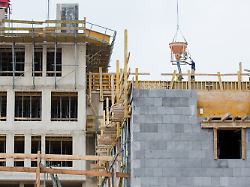Approvals are declining
The construction slump continues unabated
March 18, 2024, 9:25 a.m
Listen to article
This audio version was artificially generated. More info | Send feedback
Expensive materials, high interest rates, a poor economic situation – Germans have had little desire to build in recent months. In January, the number of building permits fell again drastically compared to the same month last year.
The decline in building permits for new apartments continued at the beginning of the year. The number fell by 5,200 or 23.5 percent in January compared to the same month last year to 16,800, as the Federal Statistical Office announced. Compared to January 2022, there was even a drop of 43.4 percent. Over the past year as a whole, the number fell by more than a quarter to around 260,000 apartments. Expensive materials and expensive financing compared to previous years deter many potential home builders and investors.
The decline in building permits was greatest for single-family homes at 42.7 percent compared to January 2023 to 2,800. A decline of 19.6 percent to 1,100 was reported for two-family homes. The number of approvals also fell significantly for multi-family homes – the largest type of building in terms of numbers: here there was a decrease of 20.0 percent to 9,200.
Chancellor Olaf Scholz expects the downward trend to end. “There is much to suggest that housing construction is now stabilizing,” Scholz said on Friday at an event to mark the 125th anniversary of the Central Association of the German Construction Industry (ZDB). The labor market is remarkably robust; more women and men are employed in Germany than ever before. “Thanks to rising wages, purchasing power is also growing, and building prices could finally fall again this year after years of increases,” said Scholz. In addition, many building materials have now become cheaper.
The federal government originally set itself the goal of 400,000 new apartments annually in order to meet the growing demand, especially in large cities. According to experts, it is unlikely to achieve this in 2024 either. The German Institute for Economic Research (DIW), for example, assumes that this target of 265,000 apartments will once again be clearly missed. According to the “Social Housing” alliance, there is a shortage of more than 910,000 social housing units alone.
